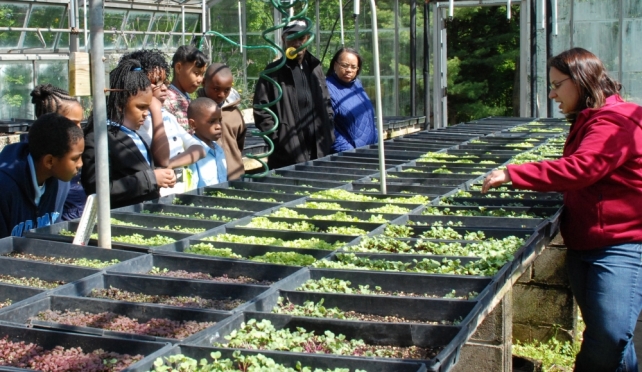By Sheila Kinkade, Board Member
For two decades, I’ve written about programs and approaches for addressing the needs of young people around the world. Much of my work has focused on what it takes to equip youth with the essential life skills—confidence, teamwork, responsibility, creative thinking, goal setting—they need to succeed as adults. Now, as a Friends of Great Kids Farm board member, this is the lens through which I view much of what is being cultivated at the Farm.
Take, for example, the Farm’s spring Garden Summit where 100 elementary and middle school students, accompanied by their teachers, learned what they needed to know to create a 4x4 foot raised bed garden at their school. In demonstrations led by their high school peers, they were taught the steps they would need to follow to bring their gardens to life—from sowing seeds to transplanting seedlings to caring for mature dill, carrot, pea, pumpkin, and basil plants.
In the weeks to come, these students will learn to plan, to be patient, to work together, to exercise responsibility, and to accept both success and, at times, failure. Most importantly, they will learn that through their efforts, they are able to produce something tangible, life affirming, and yes, edible.
Numerous studies underscore the link between gardening and children’s wellbeing, learning, and development. One of these, carried out by the National Foundation for Educational Research in the UK, found that “schools that integrate gardening into the curriculum are developing children that are more responsive to the challenges of adult life.” According to the report, gardening in schools encourages children to be active learners; enables them to become more resilient, confident, and responsible; supports healthier, more active lifestyles; and helps children communicate and work with people from all ages and backgrounds.” The Royal Horticultural Society, which commissioned the study, went on to affirm that gardening in schools is a necessity.
Imagine, gardens an educational necessity!
The benefits of immersing students in nature’s classroom extend even beyond these much-heralded life skills. In Birthright: People and Nature in the Modern World, Stephen Kellert, PhD, speaks to the fundamental need to connect children to the natural world. Time spent in outdoors, writes Kellert, drives the development of our senses, emotions, intellect, and spirit. It is here that we connect to a sense of something larger than ourselves.
On my visits to the Farm, I’m always struck by the curiosity, awe, and excitement that children experience when they sniff fresh sage for the first time, pluck a carrot from the earth, or feed grass to an eager goat. My passion for its mission stems from heartache about humanity’s disconnect from nature and what this means for present and future generations. Recent reports documenting the very real impact of climate change only reinforce the reality that everyone—both young and old—needs to be part of the solution. While it’s easy to grow despondent in the face of today’s environmental challenges, every visit I make to the Farm grounds me in what is right and good in the world.
Sheila Kinkade is Director of Storytelling at the International Youth Foundation.


